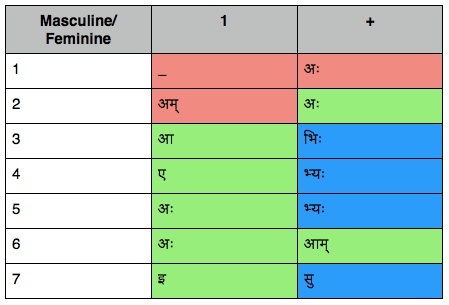|
Exercise Page 233
|
|
Consonant Stems with Three Variants
The final type of consonant-ending stem covered in the book has three variations. The masculine example is राजन्. As before, the first three forms are unique: राजा, राजानः, and राजानम्. Similarly the neuter plural form of the first two cases using the example नामन् is नामानि.
The additional variation in this type of noun occurs before the remaining 'green' suffixes that begin with vowels (i.e. अः, आ, ए, etc.). When these suffixes are added, the final vowel of the stem is dropped, e.g. नामन् + अः = नाम्नः, नामन् + आ = नाम्ना, नामन् + ए = नाम्ने, etc. This does not happen if this final vowel is preceded by a conjunct consonant. This is the case with अात्मन् (i.e. the अ is preceded by त्म्), which has the forms आत्मनः, आत्मना, आत्मने, etc.
The additional variation in this type of noun occurs before the remaining 'green' suffixes that begin with vowels (i.e. अः, आ, ए, etc.). When these suffixes are added, the final vowel of the stem is dropped, e.g. नामन् + अः = नाम्नः, नामन् + आ = नाम्ना, नामन् + ए = नाम्ने, etc. This does not happen if this final vowel is preceded by a conjunct consonant. This is the case with अात्मन् (i.e. the अ is preceded by त्म्), which has the forms आत्मनः, आत्मना, आत्मने, etc.
Negative Compounds
A noun or adjective stem can be compounded with the negative prefix 'अ' to form either a कर्मधारय or बहुव्रीहि. For example, दृष्ट is the PPP meaning 'seen', so अदृष्ट is a कर्मधारय meaning 'not seen'. Similarly, हेतु means 'cause', so अहेतु is a बहुव्रीहि meaning 'having no cause'.
अ can also be added to gerunds and participles to negate the action they convey. For example, गत्वा means 'having gone', so अगत्वा means 'not having gone' or 'without having gone'. If the stem or gerund to which अ is added begins with a vowel, the अ is changed to अन्.
अ can also be added to gerunds and participles to negate the action they convey. For example, गत्वा means 'having gone', so अगत्वा means 'not having gone' or 'without having gone'. If the stem or gerund to which अ is added begins with a vowel, the अ is changed to अन्.
द्वन्द्व Compounds
Two or more noun stems can be added in simple conjunction to form a द्वन्द्व compound. This is the only type of compound in which stems can be added more than two at a time. If the compound refers to individuals, the compound will be declined as plural and according to the gender of the final stem. For example, राम + सीता + लक्ष्मण is compounded and declined in 1/+ as रामसीतालक्ष्मणाः. If the compound refers to a group, it is declined as neuter singular. For example वाक् ('mouth'), पाणि ('hand'), पाद ('foot') can be compounded and declined in 1/1 as वाक्पाणिपादम्, referring to the group of body parts as a whole.


